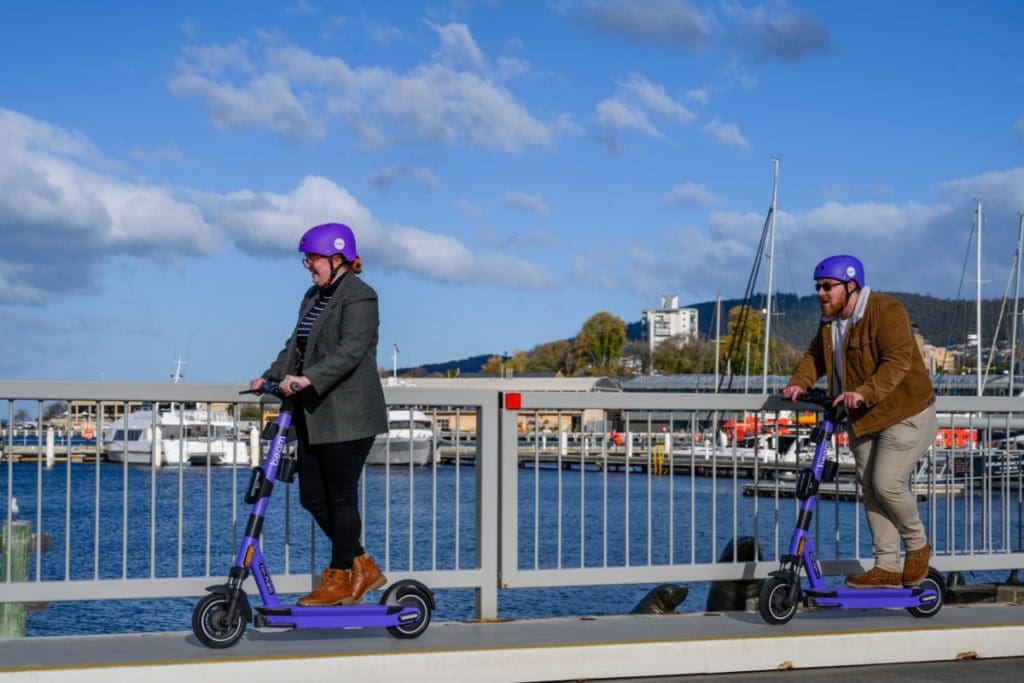Testing Starts for Tasmanian Scooter Trials

Hobart & Launceston, Tasmania
e-Scooter share service trials were launched in Tasmania in mid-December, shortly after new laws were introduced in the State to allow scooters and other personal mobility devices (PMD) to be used on footpaths, shared paths, bike paths and some roads.
Beam and Neuron have been chosen to operate the 12-month trial services in the cities of Hobart and Launceston, following a joint selection process for the two councils.
The City of Hobart’s City Infrastructure Committee Chair, Bill Harvey, said electric scooters and other micromobility devices would play a “role in reducing traffic congestion in the city and encouraging more sustainable transport solutions”.
“We now have ferries running across the river and for people commuting into the city, the opportunity to pick up an e-scooter when they arrive could be an ideal ‘last mile’ option,” he said.
“They can also be used for quick trips around the city to cut out the use of cars for short trips, or for tourists to visit different parts of the city.”
Beam has reported more than 90,000 trips completed in the first month of operations in the two cities.
In late December, Beam launched a safety-first education campaign in Hobart and Launceston, to educate Tasmanians on the state legislation governing e-rideables.
Ride Kind Campaign
The digital ‘Ride Kind’ media campaign features instructions on how to park and ride safely in Hobart and Launceston, and offers five minutes of free ride time for people who complete a Beam Safety Quiz on Tasmania’s PMD legislation
Ten Beam safety ambassadors in each city will patrol high-traffic areas each day to promote safe riding and parking.
The campaign is complemented by initiatives already operating at Beams other service locations:
a ‘Half Beam’ mode for new riders, with reduced acceleration for novice riders
A ‘three strikes’ policy for repeat offenders with helmet compliance, dangerous riding or bad parking. More serious offences such as the destruction of property, drink and underage riding will result in immediate and permanent bans.
Beam’s Australia & New Zealand General Manager, Tom Cooper, said: “Micromobility is the first new significant form of road transport since the widespread introduction of the car on Australian roads and, as with the introduction of any new mode of transport, we are adapting based on community feedback, how Tasmanians are using the e-scooters, and working collaboratively with government bodies to ensure safety.
“We believe that, as cities have found with road safety for cars, the safe introduction and expansion of micromobility on Tasmanian roads is a combination of several things, including education, quality of vehicles, infrastructure and enforcement.”
A City of Hobart statement said Beam and Neuron were chosen because of their extensive experience in Australia and overseas, and their commitment to safety, amenity, job creation and accessibility.
Safety features offered by the successful vendors include a low-speed beginner mode, pedestrian detection sensors, and dangerous rider behaviour detection. In addition, users are not able to complete their ride session if the scooter is left in a designated no-parking zone, and a team of Rapid Response Rangers attend to fallen or incorrectly parked scooters, customer complaints, and any incidents involving a scooter.
In late January, two Hobart City councillors called for the trials to be suspended so an “urgent report” could be prepared on the risks posed by rental scooters.
According to an ABC report, Aldermen Jeff Briscoe and Marti Zucco said disability advocates and senior citizens had “expressed deep concerns” about the use of scooters on footpaths, following “many instances” of them being “used inappropriately … including doubling up, vandalism, kids under 16 using them, no helmets and inappropriate speeds”.
The two share scheme providers stated there had been four minor accidents in Hobart.
Beam has implemented a no-go zone along Sandy Bay Road in Hobart after a man riding one of its scooters crashed into an elderly woman stepping out of a cafe.
Neuron is operating 300 scooters in Hobart and 200 in Launceston, incorporating its pioneering app-controlled helmet lock to secure a helmet to every e-scooter in between trips.
Its safety measures include topple detection, voice guidance to educate and warn riders on how to ride safely; and a ‘Follow my Ride’ function.
The City of Hobart will conduct a formal community consultation phase this year to gain feedback from users, businesses, and other members of the community to help determine the success of the trial.
